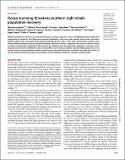Files in this item
Ocean warming threatens southern right whale population recovery
Item metadata
| dc.contributor.author | Agrelo, Macarena | |
| dc.contributor.author | Daura-Jorge, Fábio G | |
| dc.contributor.author | Rowntree, Victoria J | |
| dc.contributor.author | Sironi, Mariano | |
| dc.contributor.author | Hammond, Philip S | |
| dc.contributor.author | Ingram, Simon N | |
| dc.contributor.author | Marón, Carina F | |
| dc.contributor.author | Vilches, Florencia O | |
| dc.contributor.author | Seger, Jon | |
| dc.contributor.author | Payne, Roger | |
| dc.contributor.author | Simões-Lopes, Paulo C | |
| dc.date.accessioned | 2021-10-21T12:30:02Z | |
| dc.date.available | 2021-10-21T12:30:02Z | |
| dc.date.issued | 2021-10-15 | |
| dc.identifier | 276371902 | |
| dc.identifier | 5e727041-922d-4d17-bfe9-99111fb5c052 | |
| dc.identifier | 85117223782 | |
| dc.identifier | 000707571700017 | |
| dc.identifier.citation | Agrelo , M , Daura-Jorge , F G , Rowntree , V J , Sironi , M , Hammond , P S , Ingram , S N , Marón , C F , Vilches , F O , Seger , J , Payne , R & Simões-Lopes , P C 2021 , ' Ocean warming threatens southern right whale population recovery ' , Science Advances , vol. 7 , no. 42 , eabh2823 . https://doi.org/10.1126/sciadv.abh2823 | en |
| dc.identifier.issn | 2375-2548 | |
| dc.identifier.other | RIS: urn:4AC94D750422799478E9C2615813F7BF | |
| dc.identifier.other | ORCID: /0000-0002-2381-8302/work/101958299 | |
| dc.identifier.uri | https://hdl.handle.net/10023/24179 | |
| dc.description | Funding: This work was supported by CAPES doctoral scholarship (M.A.), CAPES-PRINT grant 88887.370641/2019-00 (M.A.), CNPQ research grant 305573/2013-6 (P.C.S.-L.), and CNPQ research grant 407190/2012-0 (F.G.D.-J.). Funding for aerial surveys since 1971 was provided by numerous donors through Ocean Alliance and Instituto de Conservación de Ballenas such as Wildlife Conservation Society, National Geographic Society, World Wildlife Fund, Alfredo Fortabat Foundation, Turner Foundation, Canadian Whale Institute, I. Kerr, A. L. de Fortabat, S. Haney, A. and J. Moss, A. Morse, P. Singh, P. Logan, N. Griffis, and C. Walcott. | en |
| dc.description.abstract | Whales contribute to marine ecosystem functioning, and they may play a role in mitigating climate change and supporting the Antarctic krill (Euphausia superba) population, a keystone prey species that sustains the entire Southern Ocean (SO) ecosystem. By analyzing a five-decade (1971–2017) data series of individual southern right whales (SRWs; Eubalaena australis) photo-identified at Península Valdés, Argentina, we found a marked increase in whale mortality rates following El Niño events. By modeling how the population responds to changes in the frequency and intensity of El Niño events, we found that such events are likely to impede SRW population recovery and could even cause population decline. Such outcomes have the potential to disrupt food-web interactions in the SO, weakening that ecosystem’s contribution to the mitigation of climate change at a global scale. | |
| dc.format.extent | 8 | |
| dc.format.extent | 343504 | |
| dc.language.iso | eng | |
| dc.relation.ispartof | Science Advances | en |
| dc.subject | GC Oceanography | en |
| dc.subject | QH301 Biology | en |
| dc.subject | DAS | en |
| dc.subject | SDG 13 - Climate Action | en |
| dc.subject | SDG 14 - Life Below Water | en |
| dc.subject.lcc | GC | en |
| dc.subject.lcc | QH301 | en |
| dc.title | Ocean warming threatens southern right whale population recovery | en |
| dc.type | Journal article | en |
| dc.contributor.institution | University of St Andrews. School of Biology | en |
| dc.contributor.institution | University of St Andrews. Sea Mammal Research Unit | en |
| dc.contributor.institution | University of St Andrews. Scottish Oceans Institute | en |
| dc.contributor.institution | University of St Andrews. Centre for Research into Ecological & Environmental Modelling | en |
| dc.contributor.institution | University of St Andrews. Marine Alliance for Science & Technology Scotland | en |
| dc.identifier.doi | 10.1126/sciadv.abh2823 | |
| dc.description.status | Peer reviewed | en |
This item appears in the following Collection(s)
Items in the St Andrews Research Repository are protected by copyright, with all rights reserved, unless otherwise indicated.

